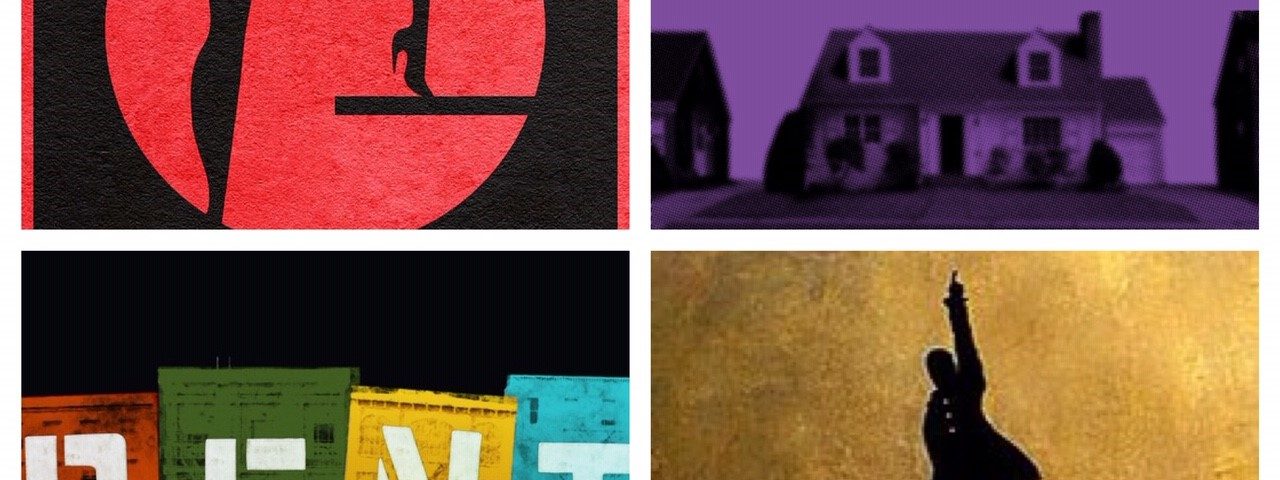Love the musicals of Rodgers and Hammerstein? New to musical theatre altogether? Looking for ways to connect to the innovation of today’s stages? Dr. Courtney Sherman is here to help.
There’s something to be said about a solid Golden Age musical. The large production numbers, the elements of romance and/or comedy, the comfort of plot predictability, and of course, the tunes! What’s not to love? Well, for some audiences, perhaps one important thing: relatability.
I have the good fortune to engage with the musical theatre repertoire on a daily basis. I train the singing voices of aspiring performers, and I teach students in the general education curriculum about this history and development of the genre. Each time I teach Musical Theatre History, I ask the class to tell me one thing they like about musicals and one thing they dislike. Generally speaking, the “likes” include things such as: impressive performance skills, cool technical displays, and catchy tunes. The “dislikes” almost always center on one theme: it’s just not realistic—real people do not walk around suddenly bursting into song. Okay, full disclosure: occasionally I do, in fact, burst into song. But I am a singer, and that’s just the natural order of things sometimes.
But I digress. By the time we finish the semester, I’m always hopeful that the students have learned that there’s so much more to musical theatre than good songs presented in an unrealistic fashion. American Musical Theatre has changed dramatically (no pun intended) since it’s golden age, which is loosely considered to be from Oklahoma! (1943) to Fiddler on the Roof (1964). The beloved musicals of creative teams such as Rodgers and Hammerstein and the like stay firmly grounded in the hearts and minds of many theatre-goers and performers of the past and present. Still, for many others, there’s a desire for something different. Something more relatable to the issues of our modern society. Shows that tout a musical style that is more in line with the popular music of today. And for others, it’s a question of reconciling their love of the shows and styles of the past with what’s being presented on the Broadway and touring stages of today.
So, here are some recommendations—a few musicals from the past 20-or-so years, and why you should check them out. Disclaimer: this is in no way an exhaustive list. There is so much good theatre out there. But we have to start this list somewhere. In no particular order, here we go.
- Rent. Okay, I did say “20-or-so” years. This one premiered in 1996. But it was pretty groundbreaking. It took a big leap forward in terms of the sorts of themes explicitly explored in a musical—themes like the AIDS crisis, poverty, drug addiction, and resilience in the face of loss. Also, it utilized rock music as the basis for the musical score. This in particular opened the door for many musicals in the coming years. Oh, and one more thing: it won the Pulitzer Prize for Drama—one of only 9 musicals to have won the award. For those that love opera, you might like this one. It takes the story from Puccini’s La Bohème and updates the central issues to match the context of time/place. Of course, the musical style is also quite different. But you’ll recognize character names, relationships, and basic themes throughout.
- The Color Purple. I saw this musical at the Milwaukee Repertory Theatre a few years ago. It ranks up there as one of my all-time favorite theatre-going experiences. The musical score, impressive singing, and heart-breaking storytelling sticks with me still. It is an adaptation of Alice Walker’s 1982 novel of the same name.
- Next to Normal. This is one of the other 9 musicals to have won the Pulitzer Prize for Drama. Like Rent, it utilizes rock music as the basis for the score, and is largely through-composed (almost all of the text is delivered through song). This musical addresses many heavy-hitting themes, including grief, depression, and ethics in modern psychiatry, in the context of a suburban family.
- Cabaret. Many seasoned theatre-goers have encountered this musical (premiered in 1966). In fact, even novice theatre-goers may have encountered it in the context of the 1972 film version starring Liza Minelli. Interestingly, this musical has gone through a number of revivals. Each time, layers are pulled away to reveal more honesty, grittiness, and intensity. Cabaret is considered a “concept musical,” which in part means that it relies heavily on metaphor to tell the story. But, revisions of the script that came about as a result of two notable revivals (1993 in London and 1998 on Broadway) have taken us quite a distance from the style of the original production in 1966, leaving audiences with an increasingly more explicit message.
- Hamilton. This really is a must-see. Lin-Manuel Miranda’s song-writing and text-expression prowess are on full display here. Is this an exact, historically accurate re-telling of Alexander Hamilton’s life? Perhaps not. Were there some liberties taken? Of course. But if this musical, with its innovative storytelling devices, opens the door for a new generation of U.S. History buffs to emerge—or a new generation of theatre-goers to be born, then I consider that a pretty substantial win. The original cast was comprised almost entirely of non-white actors. The musical style is almost entirely that of hip-hop, R&B, and rap. It’s innovative in many ways. As you may have guessed, this is yet another of the 9 Pulitzer Prize winners.
- The Book of Mormon. It occurs to me that I have not brought any comedies to your attention on this list. I saw this one in Chicago a few years ago. I have never laughed harder in my life. Much of the humor is indeed for mature audiences, so consider yourself appropriately warned. This musical was written by the creators of South Park. That’s probably about all I need to say here.
- Hadestown. This one is new. It involves a mythical quest. I do not know much about it yet (summer project!), but it’s generating quite a bit of buzz lately. Some of my students are pretty into it. Check it out and let me know what you think!
- Movies-Turned-Musicals: There’s a category of musical theatre popular today I like to call “the movical.” Some Broadway purists do not approve of these, on the grounds that writers and producers today should be creating more of their own work. I’m willing to be okay with most movicals because there still is a lot of great original work being produced. For those that have never seen a musical and are thinking about getting into it, I think movicals can be a great first step. If you loved Legally Blonde the movie, chances are pretty decent that you’ll be charmed by the musical. So, if you’re not sure you’re ready just yet for those other plays I listed above, check out one of these: Waitress, Mean Girls, Legally Blonde, and Heathers.
So, there you have it. A few suggestions to check out, if you’re unsure about the musical theatre repertoire gracing the stages of Broadway, touring houses, or even your local community theatres. If you ultimately find that you still love the Golden Age musicals the most of all, don’t worry! Many of those musicals have remained solidly in the oft-performed repertoire, with refreshing revivals happening all the time!
For more information on what’s happening on Broadway these days, and other general information about musical theatre, check here. https://www.broadway.com/
 By Dr. Courtney Sherman
By Dr. Courtney Sherman
Dr. Courtney Sherman is an associate professor of Music at UW-Green Bay, where she teaches courses related to vocal music in the Music and Theatre & Dance programs. She serves as musical director for the university’s musical each Fall. She also sings a fair bit, and serves on committees (and likes it). For fun: she’s pretty okay a cycling and hiking, and makes the most of the good weather months each year doing those two things a lot.

Dr. Sherman,
Liam Robinson, Preble graduate (2000 ish) is the musical director for Hadestown